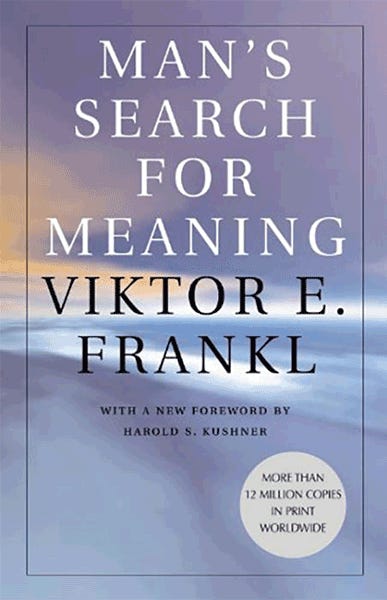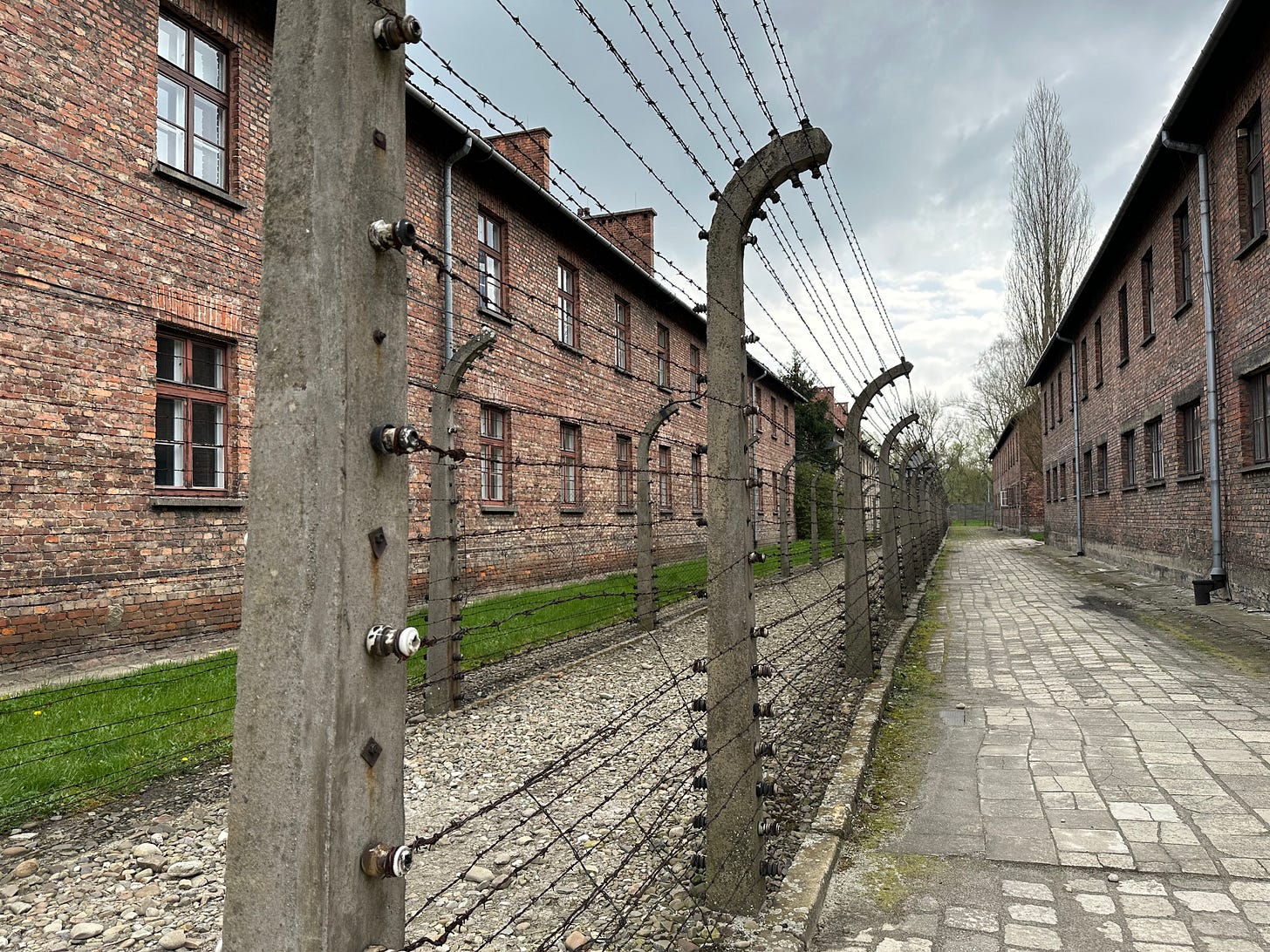The Will to Find the Why
Man's Search for Meaning by Viktor E. Frankl
Some books seem to follow us throughout our lives. One book in particular has been tailing me for 40 years, and it happens to be one of the first psychology-related books I ever read. I initially heard about Viktor Frankl’s Man’s Search for Meaning in 1984 when my psychology-major brother Mike recommended it to me. At the time I was a dance major, and so reading psych books for pleasure ranked somewhere between washing my leg warmers and suffering through stretching sessions. In other words, I didn’t read the book.
But I loved and respected my older brother, so his words about the book stuck with me. He explained that Frankl was a Holocaust survivor and a humanistic therapist. We were both pretty turned on by humanistic psychology at the time, owing much of it to our mother who wrapped her arms around the world. The premise of the book, Mike explained to me, is that no matter what life throws at us, we always have the power to choose how we think and feel.
As most young adults, I struggled to find meaning in my own life over the next decade as I went from dance major to elementary school teacher to studying for a masters degree in counseling. It was in that counseling program where Man’s Search for Meaning found its way onto my required reading list. I read the book as part of my research on traumatic recovery, and thus began my long relationship with this title. As I read it that first time, I quickly understood why my brother was so moved by the text.
The book’s basics
Frankl wrote the first version of Man’s Search for Meaning over nine days in 1945, just a short time after his liberation from the fourth concentration camp in which he was imprisoned. Part I of the book details the trials Frankl endured as a prisoner during the latter days of World War II. When I first read the book as a counseling student, I benefited from Frankl’s masterful job of naming the wide variety of emotions exhibited by prisoners, such as shock, disgust, fear, longing, apathy, and envy, as well as psychological processes such as detachment, delusion of reprieve, grim humor, regression and more. Frankl explained the adaptive range of reactions prisoners exhibited by writing:
“An abnormal reaction to an abnormal situation is normal.”
Part II of the book provides information on logotherapy, the therapeutic approach Frankl developed which involves finding meaning in life through self-transcendence. Logotherapy focuses on the future and is based on the idea that the will to meaning is a primary human drive. Patients who exhibit “existential frustration” are not viewed as having a psychological neurosis, but rather as going through a natural human experience.
Frankl proposed three ways to discover meaning in our lives:
by creating a work or doing a deed
by experiencing someone or encountering something
by the attitude we take toward unavoidable suffering
Through his experiences in the concentration camps, Frankl learned that meaning could be found in suffering, and he proposed that we give meaning to our suffering by how we respond it. He was adamant that suffering unnecessarily is pointless, and attempting to free ourselves from the source of suffering should be the first course of action. However, it is not always possible to escape suffering. In these cases, the painful situation may strip us of all but one ability - the freedom to choose how we will respond in the situation. In the book, Frankl quotes Nietzsche:
“He who has a Why to live for can bear almost any How.”
Without really being conscious of it, Man’s Search for Meaning influenced how I dealt with some of life’s inevitable blows throughout my 20s and 30s as I raised children and established a career: the daily emotional drain of being an elementary school teacher, the secondary stress of being married to a police officer, a late pregnancy loss, the death of both my parents, along with an untold number of “small t” traumas. Throughout it all, I had the sense that, even if I could not change my situation, I always had the freedom to choose my thoughts about and reactions to what was happening. I believe I owe some of this ability to Frankl’s teachings.
A meaningful grad gift
Twenty years after I first read Frankl’s book, my son Sean graduated from college. Since he was (and remains) a huge Seinfeld fan, I gave him a Kramer-esque briefcase as a graduation gift and filled it with crackers for his “busy time of year.”
And in that briefcase I placed a copy of Man’s Search for Meaning. I did so not knowing if he would read it that summer or 20 years later. I believed that when the time was right, the book would find its way to his bedside table. So much of Frankl’s ideas center around letting situations naturally evolve, and he did not believe in being directive with his patients. In a similar vein, Frankl shared the following advice with his students:
“For success, like happiness, cannot be pursued; it must ensue, and it only does so as the unintended side-effect of one’s dedication to a cause greater than oneself or as the by-product of one’s surrender to a person other than oneself.”
Frankl considered the will to meaning to be a primary motivational force. He labeled the lack of meaning in life as “existential frustration” and described the “existential vacuum” that occurs when a sense of meaning is absent. He was clear in his assertion that existential frustration is not a mental disorder. Rather, it is a conflict to be resolved, possibly through the therapeutic process.
From post-war theory to positive psychology
The next emergence of Man’s Search for Meaning for me happened about ten years later when I started teaching a positive psychology course at the community college where I am now a professor. Research in positive psychology shows the importance of having sense of meaning and purpose in life, and as such Frankl’s ideas are relevant in this relatively new branch of psychology.
Within his survivor narrative are examples of how the ability to envision a positive future was psychologically self-protective. Not knowing what would happen in the future was extremely painful for prisoners. But, instead of focusing on present anxieties, Frankl envisioned himself in a comfortable lecture hall teaching about the psychology of the concentration camp in the future. This mental time travel allowed him to rise above the sufferings of the moment. Frankl wrote that the prisoner who lost a positive view of the future was doomed.
One of the practices that kept Frankl going while imprisoned was his ability to envision his pregnant wife from whom he had been separated upon entry to the camp. During one particularly difficult march to a work site in the bitter cold, Frankl conjured up a vision of his wife. He imagined her vividly and could hear her speaking to him in his mind. It was then that the following thought came to him:
“The salvation of man is through love and in love.”
It is in this moment that Frankl realized a person could be stripped of everything in the world, but could still know happiness through love of another.
Frankl also trained himself to be grateful for the smallest of mercies. He wrote:
“To draw an analogy: a man’s suffering is similar to the behavior of gas. If a certain quantity of gas is pumped into an empty chamber, it will fill the chamber completely and evenly, no matter how big the chamber. Thus suffering completely fills the human soul and conscious mind, no matter whether the suffering is great or little. Therefore the ‘size’ of human suffering is absolutely relative. It also follows that a very trifling thing can cause the greatest of joys.”
Frankl wrote about taking quiet moments of solitude as a means to fill his soul with, however momentary, joy. He also wrote about the power of appreciating beauty and nature, even in the toxic environment of a concentration camp. He encouraged savoring of positive moments. All of these practices are supported by research in positive psychology.
Once more, this time with feeling
Until recently, my understanding of Man’s Search for Meaning had been mostly academic. But last year I had the honor to be part of a leadership delegation that went to Poland to learn more about the atrocities of the Holocaust and the consequences of hate. Our group went to the sites of the Plaszow, Auschwitz, and Auschwitz II-Birkenau concentration camps. I conducted research to prepare for that trip, and once again I re-read Frankl’s words.
As I walked through the grounds of Auschwitz, I thought about Frankl’s descriptions of the horrors of imprisonment and the emotional experiences of the prisoners. And yet, Frankl wrote against “pan-determinism,” the belief that a person is wholly conditioned by the environment. He cautioned against “nothingbutness,” or the idea that a person is completely at the whim of biopsychosocial factors. Frankl viewed humans as ultimately self-determining and proposed all people can retain the freedom to choose, even in a concentration camp. Frankl wrote:
“...everything can be taken from a man but one thing: the last of the human freedoms – to choose one’s attitude in any given set of circumstances, to choose one’s way.”
Finding meaning today
To be sure, many advances in psychological theories have been made since logotherapy was first established as the third Viennese school of therapy (after Freud’s psychoanalysis and Adler’s individual psychology). After all, the first criteria for posttraumatic stress disorder (PTSD) were developed 35 years after the first publication of Man’s Search for Meaning, and many new discoveries have been made more recently about the effects of complex trauma on the stress response system.
Still, Frankl’s ideas have an important place in the discussion of mindsets that contribute to greater life satisfaction. As I approach 60 years of age, the search for meaning has only ramped up for me. I am grateful to have work that fills my soul, many people to love, and the belief that no matter what happens, I have freedom to make up my own mind. And that little book that has been nipping at my heels all my life has something to do with that.
Publication Details: Frankl, Viktor E. (1962). Man's Search for Meaning: An Introduction to Logotherapy. Boston: Beacon Press
For students of psychology : This book may be useful in courses such as general psychology, social psychology, positive psychology, and clinical/counseling psychology
For students of life: Of course, anyone interested in learning more about the Holocaust will benefit from reading this historical narrative. Other people can read this book if they seek to find ways to build meaning in their life. In addition, some readers who are experiencing difficult times might find inspiration to find ways to transform suffering through meaning
Find a Copy of the Book:
Independent bookstore of the month - Strand Book Store - $27.95
And of course, your local library!




